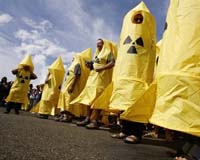| . |  |
. |
Washington (AFP) Sept 9, 2009 British lawmakers Wednesday pressed US President Barack Obama to prove through actions rather than just words that he is committed to his stated goal of a nuclear-free world. "We are here really to see whether this is just aspirational or whether there is something real in the Obama agenda," said Tony Lloyd, the chair of Britain's Parliamentary Labour Party. "Can he deliver on the process that takes us farther toward a nuclear-free world?" Lloyd was visiting Washington with members of a newly-convened, cross-party group dubbed UK Parliamentarians for Multilateral Nuclear Disarmament and Non-Proliferation. The group, which includes former ministers and generals, was to meet key US legislators and Obama administration officials this week to gauge the nuclear policies of the new administration. David Lidington, Britain's Conservative shadow minister for foreign affairs, called for a series of benchmarks in disarmament talks. "The nuclear-free world, yes, we would sign up to that as an objective, but we are not starry-eyed about this being quick or easy," he said. The comments at the Carnegie Endowment for International Peace think-tank came ahead of a special UN Security Council summit to be chaired by Obama on September 24 to discuss the way forward for nuclear disarmament. Members of the British group expressed concern that six months after a key speech in Prague -- when Obama called for a world free of nuclear weapons -- he may lack votes in the US Senate to ratify the Comprehensive Nuclear Test Ban Treaty (CTBT). Drawn up in 1996, the CTBT has been signed by 181 countries and ratified by 149. But it needs to be ratified by nine others, including China and the United States, before coming into force. Without Washington signing on, the group said Obama would face major challenges in convincing the rest of the world to freeze their nuclear weapons programs. "If... the Americans disengage from this issue, then we will end up in exactly the same position in five-10 years' time that we are in at the moment," said former British defense minister Des Browne, who chairs the nuclear disarmament group. David Hannay, a former British ambassador to the United Nations and what is now the European Union, echoed those concerns, saying: "If the United States does not take the lead in a sense, as we saw in the last eight years, nothing happens." With Obama's agenda topped by his ambitious plan to overhaul the US health care system and growing violence in Afghanistan, his administration has narrowly focused its arms control policies on obtaining a new nuclear arms reduction pact with Russia to replace a treaty that expires in December. Lloyd suggested that Iran's nuclear ambitions could become a linchpin in the push for global disarmament. "Iran could make serious difference to public psychology of this debate," he said. "If Iran does get nuclear arms, it's quite likely the pressure for proliferation on its neighbors -- on Turkey, on Saudi Arabia, on Egypt -- will increase." Obama has given Iran until the end of this month to demonstrate its willingness to engage in negotiations. Washington and its allies have threatened to impose a fourth set of UN sanctions if Iran, despite the objections of veto-wielding Security Council members Russia and China. Adding to the pressure, the US envoy to the International Atomic Energy Agency, Glyn Davies, said in Vienna that Iran may have enough nuclear material to put together an atomic bomb. Western governments and Israel have accused the Islamic Republic of trying to develop atomic weapons under cover of its civilian program, a charge Tehran vehemently denies. Next year will be a crucial one for nuclear policy around the world. The Nuclear Non-Proliferation Treaty (NPT) is up for review in May, increasingly challenged by countries like Iran and North Korea that seek nuclear state status. The last NPT review conference ended in disarray in May 2005 with no agreement from participating countries. And in March, Obama plans to host leaders for a global summit on nuclear security. Share This Article With Planet Earth
Related Links Learn about nuclear weapons doctrine and defense at SpaceWar.com Learn about missile defense at SpaceWar.com All about missiles at SpaceWar.com Learn about the Superpowers of the 21st Century at SpaceWar.com
 Obama provides hope for nuclear test ban treaty: UN monitors
Obama provides hope for nuclear test ban treaty: UN monitorsVienna (AFP) Sept 8, 2009 A new era of US diplomacy under Barack Obama is providing fresh momentum for a global ban on nuclear tests, monitors in a UN-backed group said Tuesday. The Comprehensive Nuclear Test Ban Treaty (CTBT), drawn up in 1996, has been signed by 181 countries and ratified by 149. But it needs to be ratified by nine others, including China and the United States, before coming into force. ... read more |
|
| The content herein, unless otherwise known to be public domain, are Copyright 1995-2009 - SpaceDaily. AFP and UPI Wire Stories are copyright Agence France-Presse and United Press International. ESA Portal Reports are copyright European Space Agency. All NASA sourced material is public domain. Additional copyrights may apply in whole or part to other bona fide parties. Advertising does not imply endorsement,agreement or approval of any opinions, statements or information provided by SpaceDaily on any Web page published or hosted by SpaceDaily. Privacy Statement |